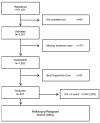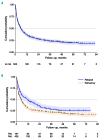The outcome of peripheral T-cell lymphoma patients failing first-line therapy: a report from the prospective, International T-Cell Project
- PMID: 29599200
- PMCID: PMC6029527
- DOI: 10.3324/haematol.2017.186577
The outcome of peripheral T-cell lymphoma patients failing first-line therapy: a report from the prospective, International T-Cell Project
Abstract
This analysis explored factors influencing survival of patients with primary refractory and relapsed peripheral T-cell lymphomas enrolled in the prospective International T-cell Project. We analyzed data from 1020 patients with newly diagnosed disease, enrolled between September 2006 and December 2015. Out of 937 patients who received first-line treatment, 436 (47%) were identified as refractory and 197 (21%) as relapsed. Median time from the end of treatment to relapse was 8 months (range 2-73). Overall, 75 patients (8%) were consolidated with bone marrow transplantation, including 12 refractory and 22 relapsed patients. After a median follow up of 38 months (range 1-96 months) from documentation of refractory/relapsed disease, 440 patients had died. The median overall survival (OS) was 5.8 months; 3-year overall survival rates were 21% and 28% for refractory and relapsed patients, respectively (P<0.001). Patients receiving or not salvage bone marrow transplantation had a 3-year survival of 48% and 18%, respectively (P<0.001). In a univariate Cox regression analysis, refractory disease was associated with a higher risk of death (HR=1.43, P=0.001), whereas late relapse (>12 months, HR 0.57, P=0.001) and salvage therapy with transplantation (HR=0.36, P<0.001) were associated with a better OS. No difference was found in OS with respect to histology. This study accurately reflects outcomes for patients treated according to standards of care worldwide. Results confirm that peripheral T-cell lymphomas patients had dismal outcome after relapse or progression. Patients with chemotherapy sensitive disease who relapsed after more than 12 months might benefit from consolidation bone marrow transplantation.
Trial registration: ClinicalTrials.gov NCT01142674.
Copyright© 2018 Ferrata Storti Foundation.
Figures




Comment in
-
Comment to "The outcome of peripheral T-cell lymphoma patients failing first-line therapy".Haematologica. 2019 Apr;104(4):e178. doi: 10.3324/haematol.2018.206904. Haematologica. 2019. PMID: 30930339 Free PMC article. No abstract available.
-
The outcome of peripheral T-cell lymphoma patients failing first-line therapy: a report from the prospective International T-Cell Project.Haematologica. 2019 Apr;104(4):e178. doi: 10.3324/haematol.2019.218305. Haematologica. 2019. PMID: 30930340 Free PMC article. No abstract available.
References
-
- Swerdlow S, Campo E, Harris N, et al. WHO Classification of Tumours of Haematopoietic and Lymphoid Tissues. 4th ed. Lyon, France: IARC Press; 2008.
-
- Vose J, Armitage J, Weisenburger D. International peripheral T-cell and natural killer/T-cell lymphoma study: pathology findings and clinical outcomes. J Clin Oncol. 2008;26(25):4124–4130. - PubMed
-
- Melnyk A, Rodriguez A, Pugh WC, Cabannillas F. Evaluation of the Revised European-American Lymphoma classification confirms the clinical relevance of immunophenotype in 560 cases of aggressive non-Hodgkin’s lymphoma. Blood. 1997;89(12):4514–4520. - PubMed
-
- Lopez-Guillermo A, Cid J, Salar A, et al. Peripheral T-cell lymphomas: initial features, natural history, and prognostic factors in a series of 174 patients diagnosed according to the R.E.A.L. Classification. Ann Oncol. 1998;9(8):849–855. - PubMed
Publication types
MeSH terms
Associated data
Grants and funding
LinkOut - more resources
Full Text Sources
Other Literature Sources
Medical

